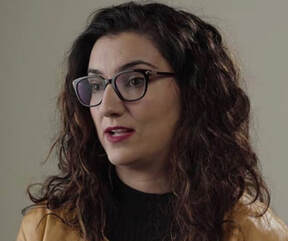About

Narges Bajoghli (pronounced: Nar-guess Baa-jogh-lee) is Assistant Professor at the Johns Hopkins University, School of Advanced International Studies. She is an award-winning anthropologist, writer, and professor.
Trained as a political anthropologist, media anthropologist, and documentary filmmaker, Narges' research is at the intersections of media, power, and resistance. She is the author of several books, including the award-winning book Iran Reframed: Anxieties of Power in the Islamic Republic (Stanford University Press 2019; winner 2020 Margaret Mead Award; 2020 Choice Award for Outstanding Academic Title; 2021 Silver Medal in Independent Publisher Book Awards for Current Events); How Sanctions Work: Iran and the Impact of Economic Warfare (with Vali Nasr, Djavad Salehi-Esfahani, and Ali Vaez, Stanford University Press 2024); and a graphic novella, Sanctioned Lives (2024).
With the support of the Johns Hopkins University Catalyst Award, Narges is currently writing her next manuscript on a global history of chemical warfare. Narges' research has been supported by grants and fellowships from the Social Science Research Council, the National Science Foundation (awarded/declined), The Wenner Gren Foundation for Anthropological Research, the American Institute of Iranian Studies, Johns Hopkins University, New York University, and Brown University.
Narges received her PhD in socio-cultural anthropology from New York University, where her dissertation was awarded the Dean's Outstanding Dissertation Award in the Social Sciences. She was also trained as a documentary filmmaker in NYU's Culture and Media Program and at the NYU Tisch School of the Arts. She is the director of The Skin That Burns, a documentary film about survivors of chemical war in Iran, distributed by Film Media Group. The film has screened at festivals and university campuses in The Hague, Hiroshima, Jaipur, Tehran, and throughout the U.S. (New York, New Orleans, New Jersey, Chicago, and Irvine). She has also directed oral history projects on survivors of chemical weapons (archived at the Tehran Peace Museum).
At Johns Hopkins University, Narges teaches classes on media, social movements, and counter-movements; contemporary Iranian politics and society; and ethnographic research methods to masters and PhD students. She is the recipient of the 2024 and 2022 Excellence in Teaching Awards at Johns Hopkins University, SAIS. Narges is the co-director of the Rethinking Iran Initiative at Johns Hopkins University, SAIS, which includes public events and research projects on contemporary Iranian society.
In addition to her academic writing, Narges has written for such publications as The New York Times, The New York Times Magazine, Vanity Fair, Foreign Affairs, The Guardian, Foreign Policy, and Jacobin. She has appeared as a guest commentator on Iranian politics on CNN, DemocracyNow!, NPR, BBC WorldService, BBC NewsHour, and PBS NewsHour as well as in Spanish on radio programs across Latin America.
Outside of academia, Narges is a cultural curator and organizer. She has founded non-profit organizations and created educational programs for middle school, high school, and college students rooted in social justice pedagogy and organizing. Narges has worked with cultural and educational collectives in North America, West Asia, the Caribbean.
Trained as a political anthropologist, media anthropologist, and documentary filmmaker, Narges' research is at the intersections of media, power, and resistance. She is the author of several books, including the award-winning book Iran Reframed: Anxieties of Power in the Islamic Republic (Stanford University Press 2019; winner 2020 Margaret Mead Award; 2020 Choice Award for Outstanding Academic Title; 2021 Silver Medal in Independent Publisher Book Awards for Current Events); How Sanctions Work: Iran and the Impact of Economic Warfare (with Vali Nasr, Djavad Salehi-Esfahani, and Ali Vaez, Stanford University Press 2024); and a graphic novella, Sanctioned Lives (2024).
With the support of the Johns Hopkins University Catalyst Award, Narges is currently writing her next manuscript on a global history of chemical warfare. Narges' research has been supported by grants and fellowships from the Social Science Research Council, the National Science Foundation (awarded/declined), The Wenner Gren Foundation for Anthropological Research, the American Institute of Iranian Studies, Johns Hopkins University, New York University, and Brown University.
Narges received her PhD in socio-cultural anthropology from New York University, where her dissertation was awarded the Dean's Outstanding Dissertation Award in the Social Sciences. She was also trained as a documentary filmmaker in NYU's Culture and Media Program and at the NYU Tisch School of the Arts. She is the director of The Skin That Burns, a documentary film about survivors of chemical war in Iran, distributed by Film Media Group. The film has screened at festivals and university campuses in The Hague, Hiroshima, Jaipur, Tehran, and throughout the U.S. (New York, New Orleans, New Jersey, Chicago, and Irvine). She has also directed oral history projects on survivors of chemical weapons (archived at the Tehran Peace Museum).
At Johns Hopkins University, Narges teaches classes on media, social movements, and counter-movements; contemporary Iranian politics and society; and ethnographic research methods to masters and PhD students. She is the recipient of the 2024 and 2022 Excellence in Teaching Awards at Johns Hopkins University, SAIS. Narges is the co-director of the Rethinking Iran Initiative at Johns Hopkins University, SAIS, which includes public events and research projects on contemporary Iranian society.
In addition to her academic writing, Narges has written for such publications as The New York Times, The New York Times Magazine, Vanity Fair, Foreign Affairs, The Guardian, Foreign Policy, and Jacobin. She has appeared as a guest commentator on Iranian politics on CNN, DemocracyNow!, NPR, BBC WorldService, BBC NewsHour, and PBS NewsHour as well as in Spanish on radio programs across Latin America.
Outside of academia, Narges is a cultural curator and organizer. She has founded non-profit organizations and created educational programs for middle school, high school, and college students rooted in social justice pedagogy and organizing. Narges has worked with cultural and educational collectives in North America, West Asia, the Caribbean.
For Narges' CV, please click here.
